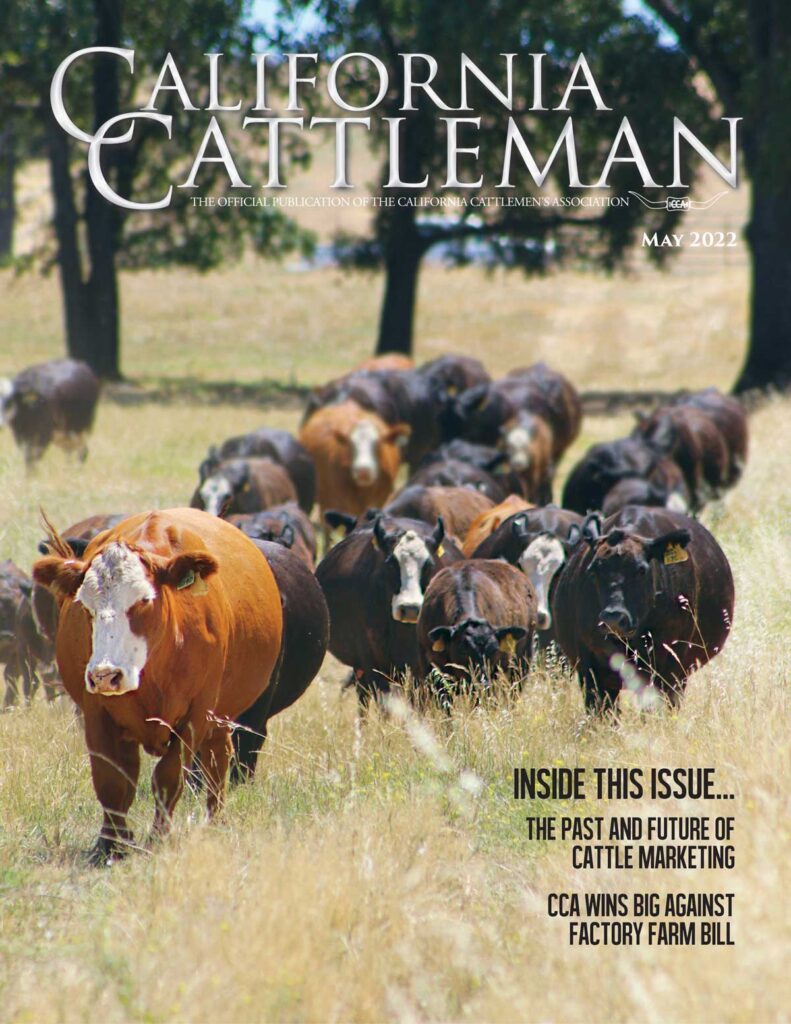
LEGISLATIVE BULLETIN
May 9, 2022
To read the full version each week, please subscribe below.
USDA Designates All California Counties Primary Natural Disaster Areas Due to Drought
Late last month, U.S. Secretary of Agriculture Tom Vilsack designated all 58 counties within the state as primary natural disaster areas due to drought. All of California’s counties qualify for the disaster designation because, according to the U.S. Drought Monitor, they suffered drought designated as Severe (D2) for at least eight weeks or suffered Extreme (D3) or Exceptional (D4) drought at any time.
According to USDA’s Farm Service Agency (FSA), the designation allows FSA “to extend much-needed emergency credit to producers recovering from natural disasters through emergency loans.” Ranchers must apply for such emergency loans by the application deadline of December 8. Emergency loans can be used to replace essential equipment or livestock or to refinance certain debts, among other purposes.
Counties in Arizona, Nevada and Oregon which border any of California’s 58 counties are deemed “contiguous natural disaster areas,” and producers in those counties are likewise eligible for assistance through FSA.
To apply for an emergency loan or inquire regarding other drought disaster relief resources available through FSA, ranchers should contact their county FSA office. You can find your county office’s contact information here. The Rancher Technical Assistance Program may be able to assist you in navigating the application process and is available at (916) 409-6902 or rtap@wrstrat.com.
CDFW Releases New Wolf Depredation Report
On Friday the California Department of Fish and Wildlife (CDFW) released a gray wolf depredation report from an investigation in Southern Lassen County. On April 28, a passer-by noticed “two wolves and a cow chasing each other.” The witness alerted the livestock producer and CDFW of the incident, and when a USDA Wildlife Services professional arrived to investigate, they found a 300 lb. calf recently deceased from wounds consistent with wolf predation.
The eyewitness documented seeing two wolves at this location and investigators found wolf tracks close to the carcass. Additionally, GPS collar data confirmed wolf LAS09F, a member of the Lassen Pack, had been in the vicinity that morning. Based on this evidence, CDFW was able to confirm the incident as a wolf depredation.
To report evidence of wolf presence including sightings or wolf signs, please fill out the survey on the CDFW Gray Wolf web page here.
SWRCB Again Extends Curtailment Suspensions in the Scott River Watershed
On Friday, the State Water Resources Control Board (SWRCB) renewed its temporary suspension of all curtailments in the Scott River watershed through midnight this Friday, May 13. The temporary suspension will remain in place only so long as minimum flow requirements are sustained at the U.S. Geological Survey’s Fort Jones gage (the minimum flow requirement throughout May is 150 cubic feet per second). If flows dip below the minimum flow requirements, diversions under the water rights included in the SWRCB’s “List A1” must cease immediately.
You can find more information on drought in the Scott River watershed on the Scott River and Shasta River Drought webpage. For any questions about curtailment notices or how to comply, please contact the Rancher Technical Assistance Program at (916) 409-6902 or rtap@wrstrat.com.
New Episode of Stories from California Cattle Country
Episode 15 of Stories from California Cattle Country “Air Superiority: Rounding Up Cattle with a Helicopter at Carver Bowen Ranch” is available now. To listen, click here. Stories from California Cattle Country is produced by the California Cattlemen’s Foundation with support from the California Cattle Council. If you want a glimpse into our travels, follow the podcast’s Instagram account @calcattlecountry.
CNRA Releases Final Pathways to 30×30 Report
The California Natural Resources Agency (CNRA) has released its Final Pathways to 30×30 Report. California’s “30×30 initiative” aims to conserve 30% of the state’s lands and coastal waters by 2030. According to the report, CNRA currently deems approximately 24% of the state as “conserved,” with the state aiming to “durably protect” an additional 6% of state lands over the next eight years. For more information on 30×30 and CCA’s work on the issue, see last week’s Legislative Bulletin and keep an eye out for the May edition of CCA’s Hot Irons newsletter.
Anti-CAFO Legislation Dies in the Assembly
Earlier this year, Assemblyman Adrin Nazarian (D-Van Nuys) introduced Assembly Bill 2764, which would have prohibited the creation or expansion of “commercial animal feeding operations” with annual revenues over $100,000. The legislation was sponsored by radical animal rights group Direct Action Everywhere and strongly opposed by CCA. AB 2764 failed to receive a hearing in the Assembly Agriculture Committee prior to the April 29 legislative deadline for fiscal bills to pass out of their first house policy committees, and as a result is dead for the year. For more on AB 2764, listen to last week’s episode of CCA’s Sorting Pen podcast, read the April 25 edition of Legislative Bulletin and see the May edition of California Cattleman.
Council on Environmental Quality Returns NEPA to Pre-2020 Regulations
The White House Council on Environmental Quality (CEQ) on April 20 released a final rule amending its regulations implementing the National Environmental Policy Act (NEPA). The amendments generally restore regulations that were in effect prior to NEPA reforms finalized by former President Trump’s CEQ in July of 2020. The final rule takes effect on May 20. For more information on CEQ’s rulemaking and its impact on NEPA analysis, see the April 25 edition of Legislative Bulletin.
CCA Joins Supreme Court Brief on Waters of the U.S.
CCA has joined the National Cattlemen’s Beef Association in filing a “friend of the court” brief in the U.S. Supreme Court case Sackett v. EPA, which challenges the Environmental Protection Agency’s authority under the federal Clean Water Act (CWA). The brief urges the Supreme Court to adopt a clear, narrow definition of “Waters of the United States” (WOTUS) that provides regulatory certainty for the nation’s cattle producers. For more information, see the April 25 edition of Legislative Bulletin.
Upcoming CCA Events
CCA Feeder Meeting
May 25-27, San Diego
Click here for registration and room block details. Both are now open!
CCA Midyear Meeting
June 22-23, Rancho Murieta
Being held just outside of Sacramento this year, we encourage you to maximize your membership by attending and being an active part of the CCA policy making process. Come hear updates from researchers, industry leaders and experts, agencies and affiliate organizations. Your voice helps develop policy that provides direction for CCA and will influence the future of ranching. Click here for details on registering and reserving your room at the Murieta Inn.
Upcoming Industry Events
AB 589 Water Measurement and Reporting Courses Scheduled for May 26 in Redding and Woodland
May 26, Redding & Woodland
The University of California Cooperative Extension (UCCE) has announced that it will offer two water measurement and reporting courses, as authorized by CCA-sponsored Assembly Bill 589 (2017), on Thursday, May 26 in Redding and Woodland. There will be a limited number of trainings offered in 2022, so early registration is encouraged. For details on the Redding training click here. The Woodland training details are available here.
USDA NRCS Services & Funding Programs Information Session
May 26, Virtual
The Fresno State Office of Community & Economic Development (OCED), USDA Natural Resources Conservation Service (NRCS), and USDA Office of Partnerships & Public Engagement (OPPE) are hosting an information session for stakeholders at 10 a.m. on Thursday, May 26. Conservation Technical Assistance and funding programs including the Environmental Quality Incentives Program (EQIP) and the Conservation Stewardship Program (CSP) will be explained. To RSVP click here.
CCA in the News
Anti-CAFO bill dies in California Assembly Western Farm Press “Assembly Bill 2764 by Assemblyman Adrin Nazarian, D-Van Nuys, failed to receive a hearing in the Assembly Agriculture Committee before an end-of-April legislative deadline for fiscal bills to pass out of their first house policy committees, and as a result is dead for the year, the California Cattlemen’s Association reports in a legislative bulletin.” To continue reading, click here.
Water Measurement and Reporting Courses Offered by UCCE May 26 California Ag Today “California Cattlemen’s Association worked with Assemblyman Frank Bigelow on a bill that allows a self-certification option. Assembly Bill 589 became law on January 1, 2018. This bill, until Jan. 1, 2023, allows any diverter who has completed this instructional course on measurement devices and methods administered by the University of California Cooperative Extension, and passes a proficiency test, to be considered a qualified individual when installing and maintaining devices or implementing methods of measurement.” To continue reading, click here.
Industry News
With water running out, California faces grim summer of dangerous heat, extreme drought Los Angeles Times “Heat waves. Severe drought. Extreme wildfires. As Southern California braces for unprecedented drought restrictions, long-range forecasts are predicting a summer that will be fraught with record-breaking temperatures, sere landscapes and above-average potential for significant wildfires, particularly in the northern part of the state.” To continue reading, click here.
Why Climate Change Makes It Harder to Fight Fire With Fire The New York Times “Changes are afoot in some states. California passed a law last year letting land managers off the hook for firefighting costs in the unlikely event that a properly planned prescribed fire goes awry. Oregon is looking to do something similar. The California legislature is considering creating a $20 million fund that would compensate homeowners for losses caused by prescribed burns.” To continue reading, click here.
Forest Service Chief says in some areas only 50% of firefighter positions are filled Wildfire Today “In testimony before the Senate Appropriations Committee on Wednesday, Forest Service Chief Randy Moore was asked by Oregon Senator Jeff Merkley about the status of hiring wildland firefighters. Chief Moore said their goal is to hire 11,300 nationwide and the current level is at 10,200, or 90 percent. He said in some areas the agency has only reached 50 percent of their staffing goal.” To continue, click here.
USDA Updates Livestock Insurance Options to Offer Better Protection, Flexibility USDA “The U.S. Department of Agriculture has updated three key crop insurance options for livestock producers: the Dairy Revenue Protection (DRP), Livestock Gross Margin (LGM), and Livestock Risk Protection (LRP). USDA’s Risk Management Agency (RMA) revised the insurance options to reach more producers, offer greater flexibility for protecting their operations, and ultimately, better meet the needs of the country’s swine, dairy, and cattle producers. The updates were published last week for the 2023 crop year, which begins July 1, 2022.” To continue reading, click here.
On this episode, we sort through AB 2476—a bill intended to prohibit new animal feeding operations and slaughterhouses in California that failed to advance in the legislature and is dead for the year. CCA’s Kirk Wilbur is back on the podcast to discuss this recent win, CCA’s leadership on it and a few other pieces of good news. Click here for options to listen.



